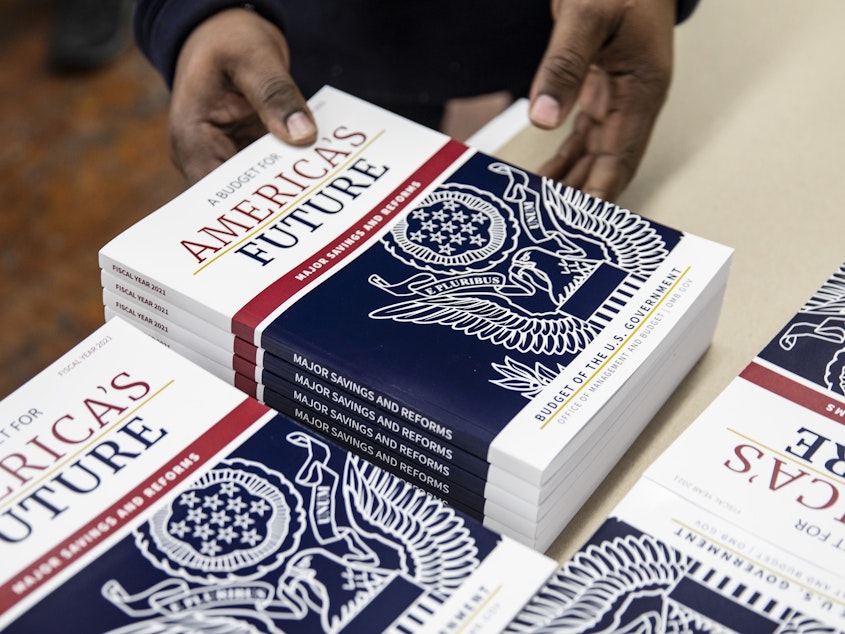Trump To Again Propose Slashing Foreign Aid In Budget

Updated at 8:30 a.m. ET
President Trump will propose $4.4 trillion in spending cuts over the next decade in his budget for fiscal year 2021 — a document that is expected to be quickly dismissed by the Democratic-controlled House of Representatives.
The proposal, set for release at 12:30 p.m. ET on Monday, will include slashing foreign aid by 21%, budget chief Russell Vought told NPR's Steve Inskeep.
The White House wants to boost funding for the U.S. International Development Finance Corporation while cutting other types of foreign aid, said Vought, the acting head of the Office of Management and Budget.
"Our view is that we have trillion-dollar deficits as far as the eye can see and we have to take care of our deficits and those numbers need to get down," Vought said in the interview.
Sponsored
Trump has proposed massive cuts to aid in each of his budget proposals. Congress, which holds the power of the purse, has ignored those past requests. "Democrats in Congress have opposed his previous budgets. We hope that changes. We probably need to have a national election before it does," Vought said.
The foreign aid cuts proposal immediately drew fire from retired Admiral Mike Mullen, who was chairman of the Joint Chiefs of Staff from 2007 to 2011. "The more we cut the international affairs budget, the higher the risk for longer and deadlier military operations," Mullen said in a letter to congressional leaders.
The budget is expected to highlight Trump's priorities on border security, tax cuts, space exploration and other policies he may pursue if he wins a second term in the November presidential election.
Trump's political rivals are expected to scour the budget for details they can brandish on the campaign trail — particularly any signs that Trump wants to cut mandatory spending on safety net programs like Medicare and Social Security.
Trump was asked in a CNBC interview last month whether cuts to "entitlements" would ever be considered. "At some point they will be. We have tremendous growth," Trump said. "And at the right time, we will take a look at that."
Sponsored
On Saturday, Trump said on Twitter that this was not the right time.
The White House and Congress negotiated a two-year spending deal last year that sets overall spending numbers for 2020 and 2021. But in details that began to leak out ahead of the budget's release, there were signs that the document would ignore that spending agreement and include cuts to social programs. Rep. John Yarmuth (D-Ky.), the chairman of the House Budget Committee, said he expected the document to be "destructive and irrational."
The budget envisions $135 billion in savings for prescription drugs in the Medicare program, Vought said: a signal that the White House hopes Congress can agree on a plan to lower drug prices. The House passed a bill in December, which the White House promptly rejected.
Trump has praised a plan proposed by Republican Senator Chuck Grassley and the Senate Finance Committee. But so far, Senate Majority Leader Mitch McConnell has not endorsed it.
Budget hawks have long urged curbs on spending — particularly on the big-ticket entitlement programs — to address the debt and deficit. Trump promised to eliminate the U.S. debt in eight years when he was first elected.
Sponsored
But his budget comes as the nonpartisan Congressional Budget Office estimated government spending outpaced revenues by about $900 billion in 2019, and said the deficit will balloon to more than $1 trillion each year beginning in 2022.
Trump's new budget proposal projects that the deficit can be trimmed by $4.6 trillion over a decade and sees a balanced budget possible in 15 years, Vought said.
That relies on economy growing at 2.8% this year and 3% thereafter — growth that exceeds the outlook from the Federal Reserve, Congressional Budget Office, and private forecasters. Actual GDP growth was 2.9% in 2018 and slowed to 2.3% in 2019.
NPR chief economics correspondent Scott Horsley contributed to this story. [Copyright 2020 NPR]



